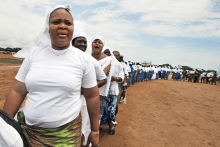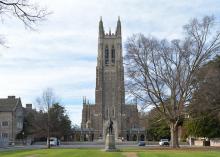call to prayer

DECADES AGO AND an ocean away, there lived a dictator who called himself a president. From 1997 to 2003, Charles Taylor served a chaotic term in Liberia’s highest office, presiding over a civil war that killed tens of thousands of his own people and inflicted traumas like rape and child soldiering on many more. Taylor was later found guilty of “some of the most heinous and brutal crimes recorded in human history” by an international criminal court at The Hague.
Taylor’s regime was ended, in part, by the prayers of ordinary Liberian women. In 2002, a 30-year-old single mother and social worker named Leymah Gbowee awoke from a sleeping dream in which she believed she heard the voice of God say, “Gather the women to pray for peace!” Gbowee founded a series of public prayer meetings that eventually included thousands of women. Over the next few years, as the women demanded peace from God and from their leaders, Taylor was arrested, violence ceased, and Liberia elected Ellen Johnson Sirleaf as president, Africa’s first female head of state.
I first heard about the Women of Liberia Mass Action for Peace movement on the last Friday night of the Biden administration. Over dinner, a friend recalled hearing a talk about Liberia’s peace movement. “These women just stood outside the presidential palace,” she recounted, “and prayed until he was removed from office.”
The following week, as Donald Trump was inaugurated for the second time and his executive orders began to reverberate around us like so many gunshots, I couldn’t stop thinking about the Liberian women who prayed. What might it look like, I wondered, to do something like that here in America?

Officials at Duke University abruptly dropped plans to broadcast the Muslim call to prayer from the iconic bell tower of Duke Chapel after online protests led by evangelist Franklin Graham and unspecified security threats.
The decision on Jan. 15 came one day before the “adhan,” or traditional call to prayer, was to be broadcast from the heart of campus in Durham, N.C.
Michael Schoenfeld, a Duke vice president for public affairs and government relations, said in a statement the school remains committed to “fostering an inclusive, tolerant, and welcoming campus” for all students but “it was clear that what was conceived as an effort to unify was not having the intended effect.”
Schoenfeld said campus officials were aware of several security threats but declined to elaborate.
Graham, who leads his father’s Billy Graham Evangelistic Association from the other end of the state, in Charlotte, said the call to prayer includes the words “Allahu Akbar,” or “God is great,” which was shouted by Islamist militants during last week’s deadly attacks across Paris.
“As Christianity is being excluded from the public square and followers of Islam are raping, butchering, and beheading Christians, Jews, and anyone who doesn’t submit to their Sharia Islamic law, Duke is promoting this in the name of religious pluralism,” he said on his Facebook page.

With a stated aim to “provoke,” Britain’s best-known TV company, Channel 4, is justifying its live daily broadcast of the “adhan” — the early hour Muslim call to prayer — and sparking applause as well as anger.
The broadcasts, airing each morning at 3 a.m. Greenwich Mean Time, will continue throughout the Muslim holy month of Ramadan.
“We are focusing on the positive aspects of Islam and hoping to explain to a broader public what Ramadan is, and what it means for the 2.8 million Muslims who take part in the UK and provide a platform for different views and different voices,” said Ralph Lee, the network’s head of programming.